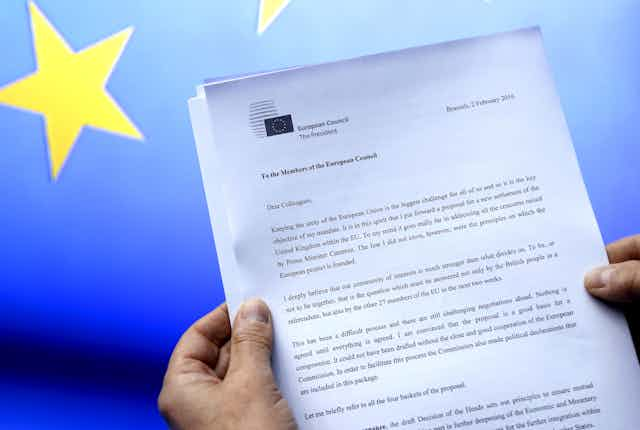Proposals on the UK’s future relationship with the European Union have given British voters a first indication of what David Cameron, the prime minister, has achieved in his attempts to renegotiate the terms of the UK’s membership.
The deal will be discussed right up until a summit of EU leaders on February 18 and 19, when it will be officially adopted – if all countries agree.
The document is written in EU legal jargon, so below is a brief guide to what it all means. There are four top issues under negotiation: free movement for EU citizens; UK sovereignty; competitiveness of the EU; and relations between eurozone and non-eurozone countries.
Free movement for EU citizens
What’s the plan? Allow the UK to impose limits on in-work benefits for EU workers. This could be for a period of up to four years after they start working in the UK, but would only be allowed on an “emergency” basis. The UK would have to make a request to the EU and that request would have to be approved by other member states in the EU Council.
Other parts of the deal would allow the UK to place more restrictions on non-EU family members of EU citizens who apply to come to the UK, and to limit the payment of child benefit to EU workers who have children in another member state. There would have to be three new EU laws, proposed after the referendum, to make all this happen.
Will it get support from the EU? The Commission has announced that it supports the proposals, and the draft deal says that the member states support the two proposals that deal with benefits. But it’s not clear if they will agree when the UK actully wants to pull the emergency brake .
It is not clear whether the European parliament supports the planned legislation – and that really is a crucial question. There is also the chance that the new laws might be challenged in the EU courts for breaching the EU Treaties.
Will it please eurosceptics? Critics will say Cameron has not asked for enough here. He has not tried to overturn the basic idea of the free movement of people. Cameron will be pleased to have secured agreement on his child benefit and non-EU family members proposals but he had asked for much more on in-work benefits. The goal was a permanent ban on benefits for the first four years after a worker arrives in the UK. Instead he has a temporary, and limited restriction.
Sovereignty
What’s the plan? A red card for national parliaments. EU member states would stop discussing a proposal for a new EU law if a large group (a majority) of national parliamentary chambers objected to it, on the grounds that the issue should not be regulated by the EU (in EU jargon, the “principle of subsidiarity”).
Will it get support from the EU? There’s no sign of any objection to this plan from other member states. It won’t be necessary for the EU Commission or parliament to agree to it.
Will it please eurosceptics? This is stronger than the rules for national parliamentary input that are currently set out in EU law. It is broadly in line with what Cameron had wanted. However, critics again argue that he should have asked for far more: a national parliamentary veto on proposed new EU laws.

The proposal also addresses Cameron’s demand to exempt Britain from the idea of “ever-closer union” of the EU. It doesn’t do that as such, but it spells out all of the different ways in which the UK can opt out of EU law or block further treaty amendments.
Critics will also be unhappy that the UK did not get a full exemption from an “ever-closer union”. Instead, the deal just reiterates all the ways the UK can opt out of EU law.
Competitiveness of the EU
What’s the plan? Here the draft deal contains a lot of general statements, but nothing very substantial. Cameron could decide to deal with the issue domestically, by changing the law to stop British civil servants coming up with more new regulation than the EU absolutely requires, when an EU law is implemented by the UK.
Will it get support from the EU? There’s not much content in the draft deal on this issue, so nothing really to oppose.
Will it please eurosceptics? Many eurosceptics wanted Cameron to go further and demand UK opt-outs from legislation on issues such as working time and agency workers – although he never really tried to do this. If he had gained opt-outs from these laws, some Labour supporters might have been less likely to vote to stay in the EU in the referendum.
Relations with the eurozone
What’s the plan? Allow the UK to delay draft laws being proposed by eurozone countries if it thinks they would affect British banking interests. But ultimately the UK would not have a veto.
Will it get support from the EU? France is particularly reluctant to let the UK have a veto in this area. However, it appears that the draft addresses French concerns already.
Will it please eurosceptics? Cameron had been hoping to get a full veto here so critics are likely to think the delay mechanism is insufficient. It’s worth remembering, though, that eurozone states are hardly likely to pay any greater heed to British concerns about EU banking laws if the UK left the EU altogether.

